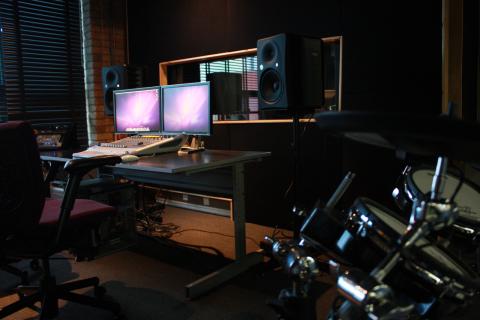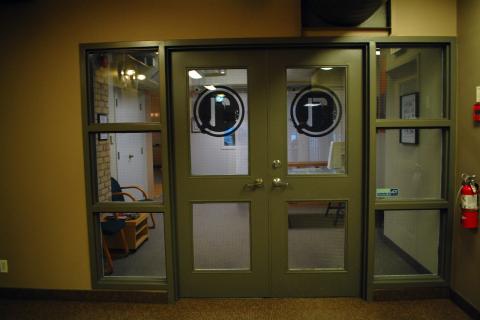
Among the programs are Creative Arts with studies in graphic design, videography and writing; Recording Arts focusing on artists, engineering and production; and an entrepreneurial program called the Art of Business, which teaches participants about setting and reaching goals. This coming semester, slated to begin in September, will introduce both the Art of Photography and City Life Film programs.
“These young people are assets," says executive director and founder Gavin Sheppard. "It's up to us to figure out what it is they're best at and then help them realize it themselves, and then build the capacity to succeed in that.
"Drake's whole movement started here,” he adds as an example. “His producer [Noah Shebib a.k.a. 40] ran our recording arts program; his DJ [Future The Prince] is a graduate of our business program; his social media and graphics person [Karla Moy a.k.a. Hustle Girl] is a graduate of our creative arts program.”
Drake, while a successful actor from a good neighbourhood, even paid to use the facility after-hours “before he got famous,” says Sheppard.
Other graduates include Photo Will, who is now Chris Bosch's official photographer; and Fresh, a fashion stylist who has worked on MuchMusic Video Award-nominated music videos.

"When you're stuck in the hood and you have all this energy, the energy is just getting all built up until you do something dumb," Sparks, a past participant of the program, says in a quote on the web site. "If it wasn't for Remix, I would be the opposite of a good guy. I would be doing very stupid shit."
The idea for The Remix Project grew out of a drop-in program Sheppard operated in 2000 whose facility was too small to accommodate urban arts and culture workshops, so he held them at live music venue Revival. In 2006, he renamed the program The Remix Project and found a sizable building near King and Dufferin streets.
“[I wanted] to help level the playing field for incredibly talented but socially disadvantaged young creatives emerging out of the city of Toronto, to act as an entry point for at-risk youth to re-engage with mainstream society on their own terms and in a way that is progressive and positive,” Sheppard explains of the concept.
Sheppard, 28, is a former artist manager (Rochester a.k.a Juice, Drex Jancar and production collective Tone Mason Inc.), but has been involved in community outreach and cultural development since he was a teenager. In addition to The Remix Project, he just returned from Kenya where he was consulting with UN Habitat's "safer cities initiative" about "the idea of arts and culture as an effective crime fighting tool."
The Remix Project facility takes up two floors, spanning 5000 square-feet, and houses all programs and workshops in open-concept floor plans. Sheppard has six full-time and two part-time paid staff and plans to hire another two full-timers this next month. The office is on one level and classes and workshops take place two floors up and includes a room equipped with a photography studio and computers with Photoshop, where the creative arts and art of photography programs are taught. There's also a recording studio with a live room and instruments (guitar, bass, electronic and acoustic drums, keyboards and samplers), plus a writing room. "Here, we can actually facilitate 30 young people and program leaders,” says Sheppard.
With the addition of the photography and film programs in September, the number of participants will increase from the usual 30 (10 students per program) to 50 each semester. "It's a 10:1 student to leader ratio,” says Sheppard. “It's in place in order for us to do what we call deep investment and really take the time to work personally with the young people." The classes run from 3 p.m. until 9 p.m. “so young people that are in school can attend; so that young people that have jobs can attend; so that young people with responsibilities to younger siblings or their own kids can attend,” Sheppard explains.
Most of the funding for The Remix Project comes from grants and investors, but like many non-profits it's a constant struggle to stay afloat.

Sheppard and his team understand how "deep investment" can change lives and what exactly it takes to reach the youth of today. Making The Remix Project "cool" is a key factor to its success. From the staff to the facility to the logo, it all feels very youth accessible, not like somebody's dad is running the show.
"Popular culture is the Trojan Horse. That's the way to get past the defences of the young people who would otherwise never engage in a social program." Sheppard adds. "We treat our organization like a brand. Whether it's the space, the aesthetic within the space, the logo development or how we do promotion, we guard that very zealously. We understand that we're actually in a war for mind space. That's the reality. We are competing with 50 Cent for who's cooler.
So if we can't offer an alternative that's just as cool and meaningful in terms of the opportunity, then we lose,” he says. "We recognize that and play to it. We are actually dropping a full clothing line soon called Get Money Get Change. Clothing will be sold locally, nationally and online through a partnership with the Get Fresh Company."
The Remix Project staff strives each semester to find a mentor for each participant. This current semester, which began in February and ends in July, is the first in the program’s history where every participant has been placed with a personal mentor. Mentors are experienced, creative people who have worked and succeeded in their respective industry. Their job is to guide their mentee in their field.
Upon graduation, the program leaders also set the young people up with a clearly defined exit strategy. Some take volunteer internships and some get an entry-level salary. Participating companies have included major record labels Universal Music Canada and EMI Music Canada; and women’s clothing store Brazen Hussy. Others get entrepreneurial business aid over a six-month period to take a product or service to market, as well as apply for grants or small business loans.

“We also give three scholarships a year to Humber College for first year to different graduates who come out of the program. If we know they are interested, we work with the participant over the six months to get their portfolio ready to do the entry test to Humber."
In recent months, The Remix Project has also added a record label (no acts have been signed yet) and branding boutique agency.
“The branding and identity boutique agency works to help corporate and government, and independent businesses, to authentically connect with the millennial market, so the 30 and under market,” explains Sheppard. “We employ our alumni to work on different campaigns ranging from event management to TV commercial production to social media campaigns. The company is a social enterprise, for-profit, but rests within the umbrella of The Remix Project, the charity, as a means to generate income not only for the alumni but also for the charity itself.”
The caring team at The Remix Project is truly what keeps the wheels in motion and the youth interested and encouraged. Sheppard clearly loves his job and his staff demonstrates the same passion, he says.
“The ultimate goal of The Remix Project is to level the playing field,” he surmises. “[It’s] to help incredibly gifted and talented young people who have been labeled "at-risk" for a whole host of different reasons to become successful in a field they are passionate about, while contributing back to society in a positive and progressive manner. A long term goal of Remix is to become a border style charter school with the TDSB.”
Nike